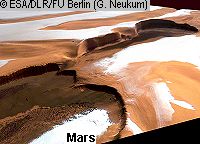Planetary scientists join forces in network to support exploration missions
Some 60 European laboratories, institutions and agencies active in planetary sciences are working together within EuroPlaNet to foster long term integration within the sector. A Coordination Action under the 'Research Infrastructures' activity of the Sixth Framework Programme (FP6), one of EuroPlaNet's principal objectives is to support the European-US Cassini-Huygens mission. During its four-year life span, the project will also bolster networking within the European planetary sciences community by promoting exchanges between partners, and will support other planetary exploration missions. The 60 EuroPlaNet partners represent 17 European countries, and expect to also work closely with US scientists. The partners are not only diverse in a geographic sense, but also in terms of their scientific disciplines. Astronomers, astrophysicists, space plasma physicists, chemists, hydrodynamics specialists and materials scientists are all involved in the project. Planetary science seeks to understand how planetary systems and their components have been formed and have evolved. A convergence of a broad spectrum of disciplines is essential if a complete picture is to be formed. The knowledge gained could provide important information on the evolution of our own planet. The partners will seek to increase the science return from planetary projects funded from the EU budget, and will also work on improving Europe's planetary science infrastructure. The network's activities should have the overall result of boosting Europe's scientific competitiveness and disseminating expertise. It is also intended to further develop public understanding of planetary science and exploration. Increasing public understanding should not be a problem, however. Planetary exploration is one of the few areas of basic research that consistently attracts attention and stimulates a desire for more information. This has been evident recently in the context of the Mars Express and Beagle 2 missions, and then the Cassini-Huygens mission. Europe has many more missions planned or underway. These include the Venus Express, BepiColombo (to Mercury) and Smart-1 (to the Moon). Rosetta and Stardust will chase comets, while Dawn will head towards the asteroids Vesta and Ceres.



